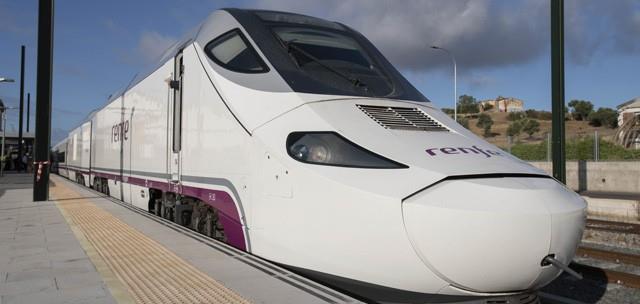Renfe introduces hybrid trains on Algeciras-Madrid line, slashing journey time by 44 minutes
Alvia S-730 units, with diesel and electric traction, will replace the Talgo service providing an 700 extra seats for passengers every week
La Voz
Cadiz
Friday, 6 December 2024, 16:19
Spain's state train operator Renfe has announced that it is changing some of units used on the existing inter-city service between Algeciras and Madrid with trains from the 730 series and marketed under the 'Alvia' brand name from 15 December. Likewise, Renfe pointed out that, with the addition of these trains, some 700 extra seats will be added per week, so the total number of seats will rise to 3,700 weekly, while also offering "greater comfort and reliability to the service."
In a statement Renfe has indicated that, from Sunday 15 December, the two daily and direct Algeciras-Madrid trains, one in each direction, will be provided with S-730 units, replacing the Talgo VI. In addition to increasing the number of seats on offer, the 730 series trains "will improve reliability, comfort and the customer's travel experience."
The company explained that, besides changing the train units operating on the line, which will lead to a saving in journey time of up to 44 minutes compared to the current one, going from 6 hours and 12 minutes to 5 hours and 28 minutes, it will modify the current timetables of these services. Therefore, the new schedule services will depart from Algeciras at 3.52pm and from Madrid at 8.05am in the morning.
The two daily trains on this route will have intermediate stops in San Roque, Ronda, Antequera Santa Ana, Puente Genil, Cordoba, Villanueva de Córdoba, Puertollano and Ciudad Real.
Renfe explained that the Alvia S-730 trains have 216 seats in tourist class, 46 seats in 'Preferente' business class (one of those spaces will be for passengers with reduced mobility) and a buffet car. Likewise, Renfe reminds its customers that trains in the 730 series are hybrids with diesel and electric traction technology, allowing these trains to extend the advantages of high speed to the non-electrified stretches of line as they have an adjustable bogey system, a feature that allows them to run both on standard gauge tracks (high speed) and conventional Spanish gauge tracks.
Finally, the state train operator pointed out that these models can run at a maximum speed of 250 km/h on high-speed track and 220 km/h on electrified conventional track, while the maximum speed for non-electrified conventional track is 180 km/h. The signalling systems incorporated (Ertms, LZB, and Asfa Digital) guarantee interoperability throughout Spain's rail network and complete the technical features embedded in one of the most versatile high-speed trains in the world.
